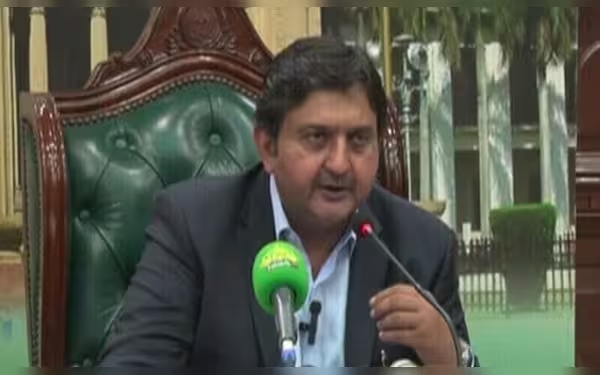Saturday, November 16, 2024 07:48 PM
Judicial Interference Allegations in Punjab Elections
- Judges allegedly urging party to prepare for elections.
- Concerns over judiciary's independence raised by Khan.
- Khan criticizes court's recent ruling on electoral symbols.
 Image Credits: dawn
Image Credits: dawnPunjab Assembly Speaker Khan claims judges are influencing political party preparations for elections, raising concerns about judicial independence.
In a significant development within Pakistan's political landscape, Punjab Assembly Speaker Malik Muhammad Ahmed Khan has made alarming claims regarding the judiciary's involvement in political affairs. He stated that certain judges are allegedly urging a political party to prepare for upcoming elections. This assertion raises serious questions about the independence of the judiciary and its role in the electoral process.
During a press conference held at the old assembly building in Lahore, Khan expressed his concerns about the potential implications of these judicial actions. He stated, "There is evidence that certain august members of the judiciary are encouraging a political party to prepare for elections." This statement reflects the ruling Pakistan Muslim League-Nawaz (PML-N)'s apprehensions that the Supreme Court, under the leadership of Justice Qazi Faez Isa, may invalidate the vote scheduled for February 8.
Khan claimed to possess documents and verdicts that illustrate how a particular political party has benefited in the past due to judicial decisions. He emphasized, "I have evidence that why a few articles of the constitution were suspended to benefit a party." This assertion points to a troubling trend where judicial decisions may be swayed by political interests, undermining the integrity of the legal system.
In reference to a recent Supreme Court ruling regarding reserved seats, Khan criticized the court for overturning the Election Commission's decision not to allocate an electoral symbol to a party that had failed to conduct intra-party elections for four years. He argued that the court's decision was based on assumptions rather than solid evidence, further complicating the relationship between the judiciary and political entities.
Moreover, Khan acknowledged the historical presence of political maneuvering within the judiciary but insisted that it must come to an end, regardless of who benefits from it. He remarked, "There was lopsidedness in the court of [former] chief justice Umar Ata Bandial as a specific five-man bench would take up all important cases." This statement underscores the need for a more balanced and impartial judicial system.
When questioned about the government's approach to cases against the Pakistan Tehreek-e-Insaf (PTI), Khan expressed dissatisfaction. He suggested that had he been in power, he would have pursued legal action against former National Assembly deputy speaker Qasim Suri for alleged fraud and applied Article 6 (sedition case) against ex-prime minister Imran Khan and former president Arif Alvi for their roles in dissolving the National Assembly amidst a pending no-confidence motion.
Khan also accused the PTI of protesting on a foreign agenda, recalling a similar situation in 2014 when the party staged a sit-in during a visit from the Chinese President. He noted that the timing of the current protests, coinciding with the Shanghai Cooperation Conference, raises suspicions about the motives behind these demonstrations.
Furthermore, Khan expressed frustration over the opposition's repeated requisitions to convene assembly sessions every 14 days solely to discuss law and order issues. He pointed out that the opposition consistently focuses on the arrests of its members, rather than addressing broader governance concerns. He stated, "If any MPA is involved in a law and order situation, the state has the right to take action against him." This highlights the ongoing tension between the ruling party and the opposition, as well as the challenges faced in maintaining order within the assembly.
The claims made by Punjab Assembly Speaker Malik Muhammad Ahmed Khan shed light on the intricate relationship between the judiciary and political parties in Pakistan. As the nation approaches new elections, the integrity of the electoral process and the independence of the judiciary will be under intense scrutiny. It is crucial for all stakeholders to prioritize transparency and uphold democratic principles to ensure a fair and just political environment for the citizens of Pakistan.













